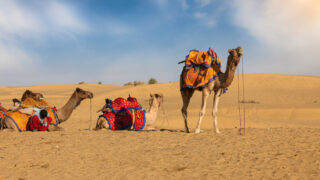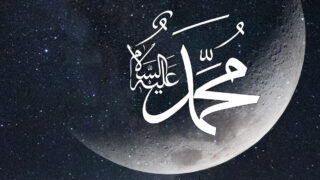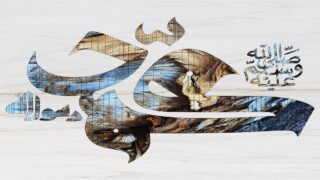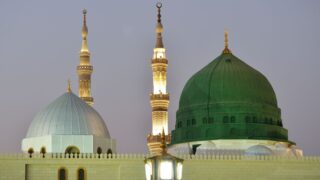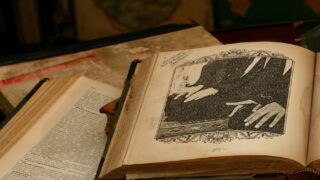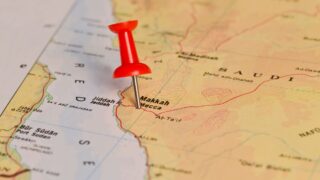On this day – the 12th of Rabi’ al-Awwal – the sun of faith rose over humanity, shone its lights on the entire universe, and that chain extended to the sky. The entire universe rejoiced at this new birth, and it was a sign for humanity to enter a new human era, an era in which man is liberated from human grip. The values of piety and spirituality are above any other values. Man transcends his life to embrace the absolute and reconnect the relationship with transcendence.
The birth of the Prophet Muhammad, may God’s blessings and peace be upon him, is a reminder to humanity of this eternal light. The person remembers his being and his spiritual subconscious memory. This birth is a sign of the moral and ethical human being, the person who is freed from the domination of his vital energy, his nutritional reproductive and possessive motives that is Controlled and directed by the spiritual energy, with force by which relationships are joint and formed in order for society to begin the throes of a new birth. A new birth in which things and people are focused towards ideas that draw a new goal for the human being, a goal that starts and is all aesthetic with the love of existence, and to live with love with existence, so that the self may live the true meaning of the continuous eternal existence.
The birth of the Prophet of Islam means a lot to the person of today, the person whose vital motives have seized him again, the person who has begun to lose the justification for his existence, the person who messes and spends for this absurdity, the person who brings misery to himself, and fills it with distress and pain… This reminder of a new birth is to move man and awaken him from the characteristic of heedlessness and distraction about the role in this world and influence on it… The moral man is possible and rather it is a duty… An obligation with what this world requires of existential wandering and the acquisition of instinct over man again… A possession that darken the existence, and the loss of meaning and anxiety of being…. It is pertinent for us, on this dear day to humanity, and it is worthy of us to celebrate this anniversary, which is a reminder of the original covenant between God and man. This is where Ibn Badiis said: Let us make in the day of his birth every year our determination to regenerate spiritually, mentally, morally, practically and historically, Islamically, and Muhammadian all over it. To give birth in our new year to a rebirth, and so we renew ourselves in every birth anniversary, we have to check our beliefs, ethics and work. And we resolve to regeneration in what’s happened, and let’s identify some of them, and let’s make it particularly the place of great care for regeneration, so that we can hold ourselves accountable for it in the coming anniversary. Abdel Hamid Ben Badis, Majaalis Al tadhkeer, p. 297.
From here, we will try to talk about the memory dear to humanity in the light of the words about the reasons for this celebration and the possible link that exists between this celebration and the reality of the Islamic nation today, and the needs of humanity and how this memory dear to the heart of humanity is all evidence of new work, and a breath of fragrance Which raises determination, strengthens wills, washes hearts again with the water of life and the sap of progress, because, as anthropology studies show, that reviving historical cultural symbols, renews the will and inflames enthusiasm in the heart, the return to the areas of illumination in the cultural past, and the ideal evidences, which embodied the message and its values in life, is not, as some semi-educated people imagine, a return to retrogression and a retreat to the historical past, No. The revival of this memory has more than one benefit and value. It is a reminder of the necessity of self-renewal according to the perfect witness, the renewal of faith in higher values, the return of rapprochement with the first moment of serenity, and a return to a human of divine instinct , i.e. the “divine instinct,” is a set of ideal meanings deposited in the soul of man, which connects him to a horizon that exceeds the energy of reality, and makes him look forward to seeing it fulfilled in his actions so that he can benefit from it; Or say that instinct is practical values of a spiritual origin, as opposed to instinct, which is behavioral facts of material origin”[2].
For this reason, it is more powerful for us to remember this memory, which does not concern Muslims alone, but humanity shares this celebration with us all, for the coming of this light that dispelled the darkness of ignorance and tyranny and illuminated the world anew with the lights of truth and faith, and destroyed the layers created by human culture separated from divine redemption. It was replaced by the law of justice and light, therefore, as one of the philosophers says, that humanity today is in need of the Lion of the Desert in order to roar again and restore to the world its lost value, and for Islamic societies, their need is doubled for this Qur’anic model, as long as the best way out of the crisis of the Islamic nation is “the formation of a new elite that thinks and feels Islamically, this elite will raise the banner of the Islamic system with the Muslim masses, and take practical steps to implement it, as Ali Izzat Begovic says.
1. From commemorating his birth to investing his love, peace be upon him
It is known in the laws of civilized change and the building of human cultural worlds, that the major tasks according to which humanity changes is performed only by the great people, who have high determination and great preparations, and as Imam Abdul Hamid bin Badis says, “No one does great things except the great of people”… And the messengers are the vanguard of civilized change throughout history, because they represent the pinnacle of human perfection in their human personality and their missionary personality. God Almighty has prepared them and fixed their movement in life, and protected them from self-loathing and submission to deviant customs and traditions, and raised them to levels above the rocky bottom of ethnic, factional and class standards and values, to evaluate the human reality, and raising it to the level of civilizational maturity that helps to open the eyes to God’s laws in horizons, souls and the Book, in knowledge and interaction “[3], and this is the secret of attraction in the personality of the Prophet, may God bless him and grant him peace, for many, especially Westerners.
There is no doubt that the personality of the Prophet, may God bless him and grant him peace, with its human perfection and its outward and inward beauty, material and spiritual, has attracted millions from the East and the West, Muslims and non-Muslims… so they devoted themselves to it with study, research, collection and composition, and this was associated, to Muslims, with attachment, love and affection, and seeking blessings and assistance Considering that his reality, may God’s blessings and peace be upon him, is superior and must be superior to what others who admired him imagined, may God’s blessings and peace be upon him, for when they admired the Prophet, may God’s blessings and peace be upon him, they imagined him as a unique genius and a hero of the great heroes, but he remained in their eyes a person who did not go beyond the framework of humanity. It does not depart from the race of heroes, even if he transcended them and surpassed them.”[4]
But despite the value of this admiration and its role in reducing the volume of offensive and demeaning sayings to the Prophet, may God’s blessings and peace be upon him, it requires impartiality, and what is meant by neutrality here is romantic admiration and literary praise, without emulation for this prophetic personality in its praiseworthy qualities and great manners. Or transforming this admiration into a practical behavior and a guiding value that takes the person of today out of the narrowness of absurdity and meaninglessness to the purposes of finality and value.
This romantic admiration for the personality of the Prophet, may God’s blessings and peace be upon him, is close to the concept of “love” that the Prophet, may God’s blessings and peace be upon him, recommended to Muslims, in his saying: “None of you believes until I am dearer to him than his son, his father, and all people.”
But we Muslims, in this celebration, the first invitation is “love for its owner,” that is, the love of the Prophet, may God’s blessings and peace be upon him, for him. Because a thing “is loved for its goodness or for its kindness, and the owner of this memory has combined them in the most perfect way. He has the goodness that made him the most perfect of people until he took on the burdens of what he brought, and this perfection is known by studying any of his manners and any day of his days. And he has the goodness that saved humanity, and it was a special and general mercy, and it extended to all of humanity” [5].
However, this love alone is not sufficient, because loyalty to the Prophet, may God bless him and grant him peace, requires the Muslim person to invest that love, and this is the purpose of renewing his memory in our hearts, “because our love for him makes us love every one of his morals and every work of his, in the memories of his birth We mention from his morals and deeds what increases our love for him and motivates us to follow his example, so we invest that love to guide ourselves, and spread it in others, that guidance that the world will not gain true happiness except if it clings to it” [6], and by its morality, love and following the example of the Prophet, peace be upon him, a Muslim person’s practical behavior is free from many moral evils, including:
a. The scourge of stagnation : [and its overall course] is that the ummah may suffice in its moral with the values that it has made an effort to implement, and does not aspire to better moral values than them, so its character is frozen in one condition, and does not fluctuate in conditions where the next is better than the previous one.
B. The scourge of separation : that the ummah’s character, when its inactiveness is prolonged, leads to a severing of its connection with the practical values that it was applying to, rather it exceeds it to a break from the first principles from which these values were taken.
V . The scourge of decadence : rigid morality descends from the rank of behavior acquired through acquaintance among the nations, to the rank of social customs, even behavioral character. Because its acquaintance origin is forgotten, and the reasons for cooperative work are taken into account.” [7]
But what are the basic pillars whose value appears to a Muslim man when he extracts them from his life and law, may God’s blessings and peace be upon him?
In the opinion of Imam Abd al-Hamid ibn Badis, the two essential pillars of his life and his law, which are the most powerful to attain, are: mercy and strength. The justification for these two pillars is that they are the basis upon which other morals have branched off, and the Islamic Sharia has not prevailed among the nations of the world except by virtue of them: mercy and strength, because the weak is defeated and the cruel is hated. Allah the almighty says: (It was through God’s mercy that you dealt with them gently; for had you been stern and hard of heart they would surely have broken away from you.) “and this indicates that hearts do not feel except for those who are gentle, merciful, and soft, and that they do not accept the cruel hearted, even if he has reached the highest level of knowledge and prestige” [8], so it remains that only the strong, the merciful, has the reins of people.
2. The principle and manifestations of his mercy
The mercy of Muhammad, may God’s blessings and peace be upon him, not to mention that its primary source is God Almighty, with what He has endowed him with a divine abundance and gift, which the will of the servants falls short of realizing his essence, however, the nature of social upbringing that knead a man and thread it’s lines in his structural psychological and ideological formation. It is known that his origin was orphanhood, which in turn bequeathed him with tenderness in the heart, benevolence in work, compassion for people, and kindness to them. There is a bug difference between someone that lived orphahood and another who heard about it. Loss of fatherhood and motherhood tenderness is a unique feeling that made the prophet view the humanity as an orphan that needs somebody to cater for and maintain her balance and take her collective self towards elevation and worship to God Almighty.
Thus, one of the manifestations of his mercy is that when his leg was bloody, his face was injured, and his quadriceps were broken, he was saying, “Oh God, forgive my people, for they do not know.” God Almighty said in His mercy by who He sent to them: We did not send you except as a mercy to the worlds.”
3. The principle and manifestations of its strength
We also do not deny the impact of the social framework on which the Prophet, may God bless him and grant him peace, grew up in its construction and grandeur. As he used to see the prestigious sitting of his grandfather Abdul Muttallib, which bequeathed him the honor and hospitality, and which was also his strength in carrying out the message and disseminating it to the people with moral and war strength, thus his firmness in spreading the message, as he said to his uncle Abu Talib – when he understood from him that he was weak from in supporting him and that he was a going to give him up -: “Oh, by God, if they put the sun in my right hand and the moon in my left, that I leave this matter until God makes it appear or I perish in it, I would not have left it.”
And from the second in the battlefields and positions of valor, when people turned away from him on the day of Hunayn – and he says riding on a mule that only those who do not flee would ride on it -: “I am the Prophet, there is no lie, I am the son of Abdul Muttalib.” Announcing his place, manifesting himself before the enemies who came from all sides”[9].
And a question may ask and says, How is strength one of his principles, and he is the Prophet of mercy, and praising this principle means opening the way for those who do not see from the prophetic inheritance except “I were helped by terror” and that Islam was spread by the sword?
We do not deny how power affects the embodiment of values in life, and makes them according to their requirements, because when you possess “the power in life, it means… to be yourself and not others, and to hold the reins of life in a process of management and leadership, that life gives you its energy and wealth, to harness it as you want.” And blow it up, as you like, and put it as you like.
As for losing strength, you will be weak, lose the ability to struggle and move, it means that you become the image of someone else, and its shadow, is like a wormwood that appears and disappears… That is the moving logic of life. When strength is lost as one of the great effective values, in the comprehensiveness of the meaning that the word possesses, to accommodate the whole life… and the opposite is true, but in cases of weakness, life begins to collapse and retreat back, while the energies diminish, shrink, and freeze in the narrow scope within the self while It resembles suffocation and paralysis.”[10]
These two pillars, i.e. the pillars of strength and mercy, are what bequeathed him, peace and blessings of God be upon him, honesty, trust and justice, so he became known among his people with these qualities. Imam Abdulhammed Ibn Badiis says: if you go through the basis of his Shariah, branches and morals, you would find them all based on mercy and strength. It is not from Islam that dissonance and that hold that some people pretend. Omar ibn al – Khattab – may Allah be pleased with him saw some people from this category: (Do not kill our religion for us, may God deal with you!), Aisha said ,may Allah be pleased her, when she saw some people walking somehow, who are these? She was told: they are some people from the reciters, and she said: (Omar was the master of the reciters, and if he walked, he would be fast, if he spoke, he is audible, and if he hit, it would be painful” [11].
So, let us make this memorial, dear to the heart of all of humanity, a cycle of renewal of the will and activation of the values of faith, reviving life in the ideal model of bringing values into life, and renewing trust again in the validity of the Islamic value system, after the one-dimensional human values and culture dominated Man is the measure of all things. The spirituality of the Messenger, may God’s blessings and peace be upon him, is spirituality from the lofty station, and his faith longings are from the living model, making those who seek to emulate him a good and spiritual life connected to the realm of the divine kingdom, and the station of great holiness.
God Almighty is the measure of all things, not man, because, as the Greek sage Plato said, the imperfect one cannot be a measure of perfection. Humans today are in need of divine measures in order to reform this human kingdom, which is weak and lost, which the Prophet of Islam, may God’s blessings and peace be upon him, taught, the meaning of living and for whom to live and what the purpose of life is. To derive from it the light of faith, and in order to renew the edifice of monotheism, and in order to fortify the hearts from their heedlessness and the overpowering of psychological desires over them.


